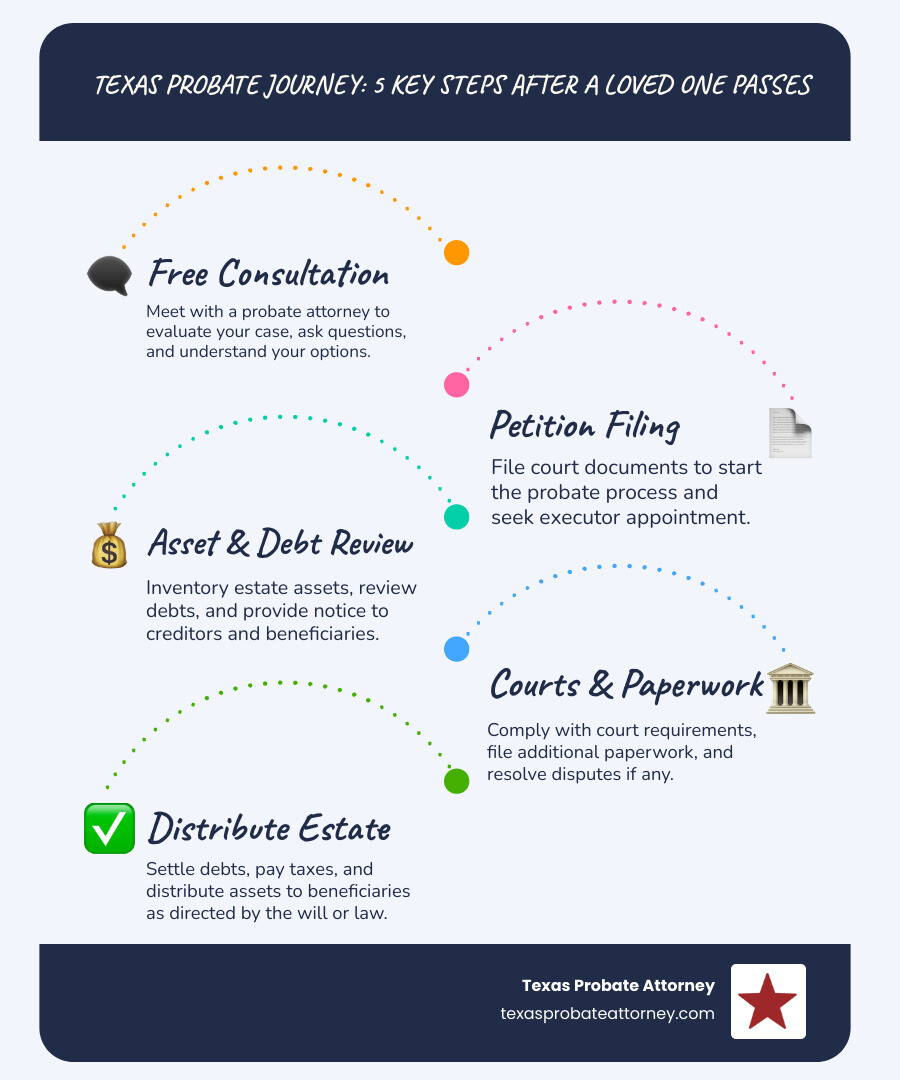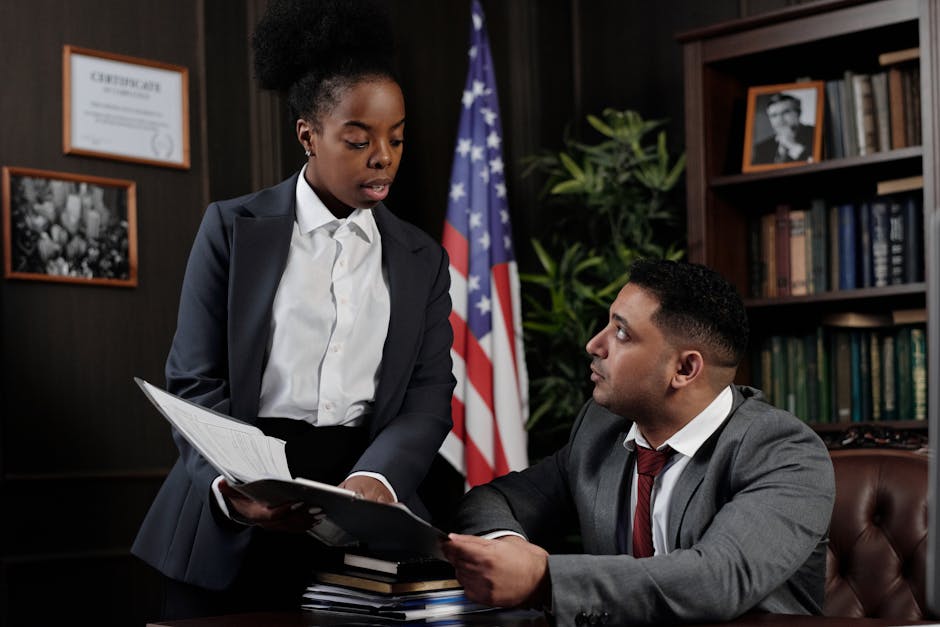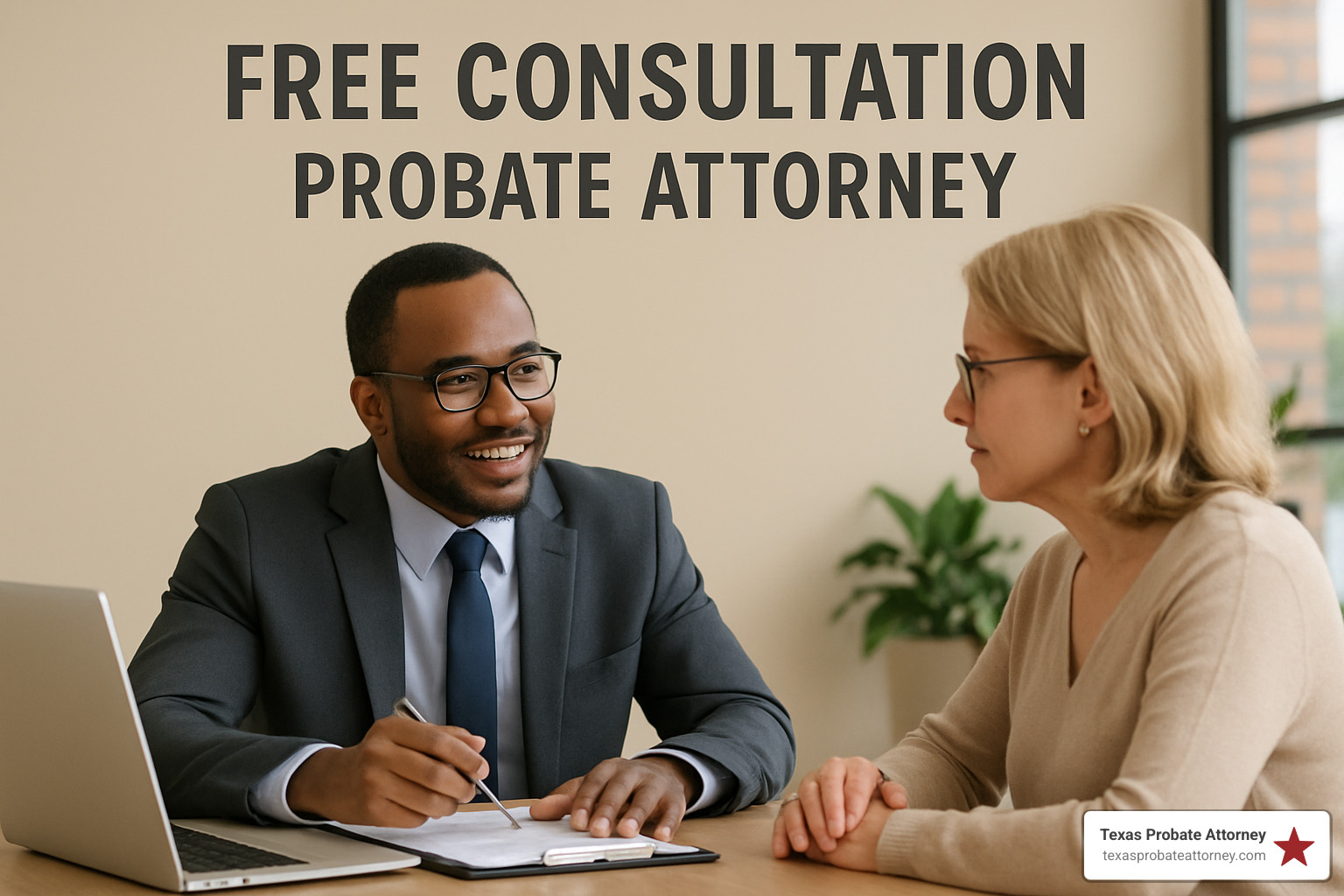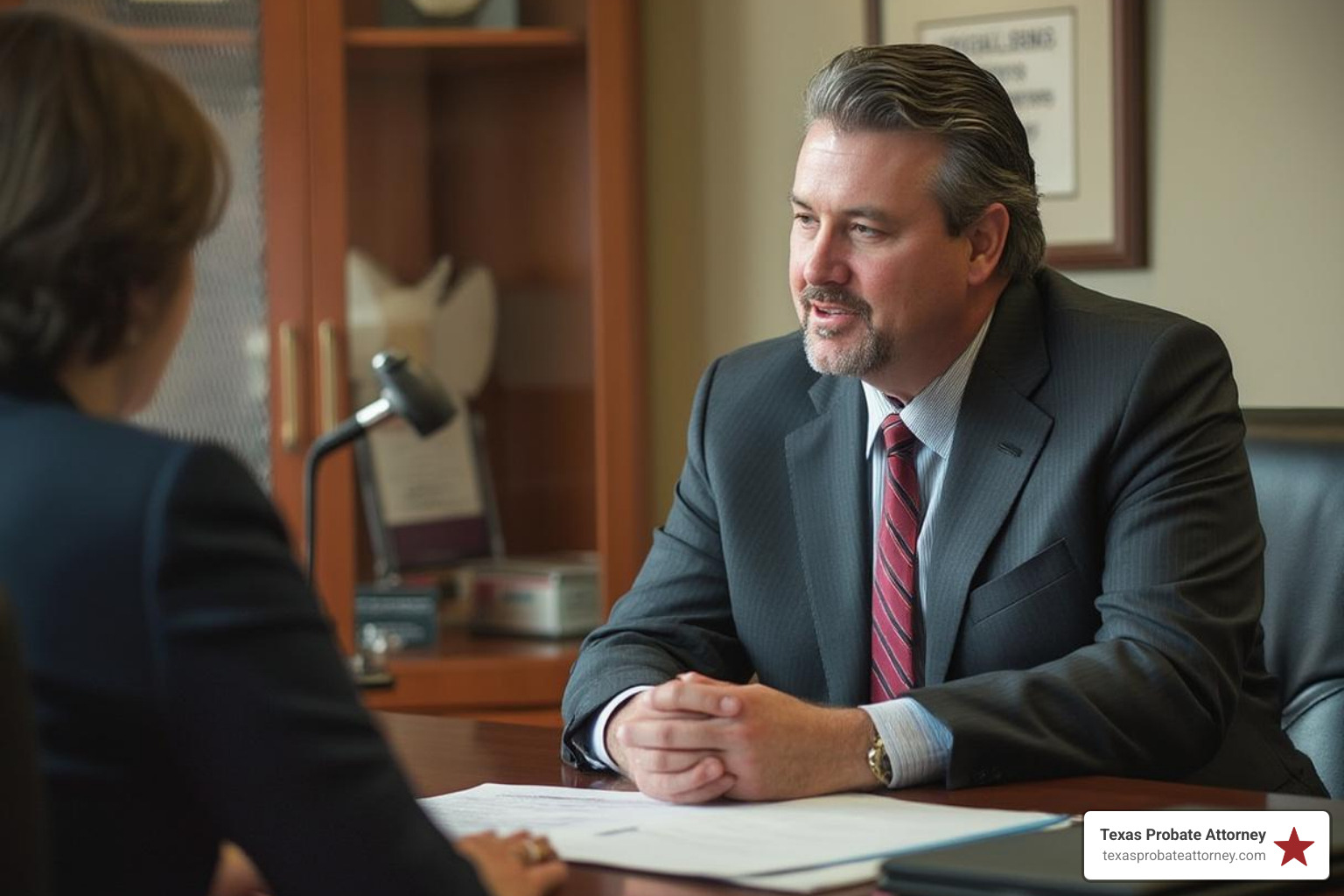Free Probate Attorney Consultations: Your First Step to Peace of Mind

Related Posts
Finding Guidance Through Grief: Why Free Probate Consultations Matter
Free consultation probate attorneys offer an essential first step for families navigating the complex legal process after losing a loved one. Here’s what you need to know:
- What it is: A no-cost meeting (typically 30-60 minutes) with an experienced probate lawyer
- What to expect: Assessment of your situation, explanation of the probate process, and discussion of legal options
- What to bring: Death certificate, will/trust documents, property deeds, financial statements
- Benefits: Professional guidance without financial commitment, peace of mind, and clarity on next steps
When you’re grieving, the last thing you want to worry about is navigating the intricate legal maze of probate. The paperwork, court deadlines, and potential family disputes can feel overwhelming during an already difficult time.
“There are few things as emotionally trying as the loss of someone close to you,” notes one probate attorney with over 30 years of experience. “Dealing with legalities during this difficult time can be overwhelming and stressful.”
In Texas, where probate can take anywhere from 9 to 18 months to complete, having professional guidance from the start can save you time, money, and emotional stress. A free consultation with a probate attorney allows you to understand what lies ahead without making a financial commitment.
During this initial meeting, an attorney will review your situation, explain the Texas probate process, and help you determine whether you need legal representation. This conversation can provide much-needed clarity and direction when you’re feeling lost in grief and uncertainty.
What Is Probate and Why Does It Matter?
Ever wondered what happens to someone’s belongings after they pass away? That’s where probate comes in. Probate is the court-supervised legal process that helps settle a deceased person’s affairs – validating their will, paying off debts, and distributing what remains to the rightful heirs. In Texas, this process follows the Texas Estates Code and typically happens in the county where your loved one lived.
“Probate administration involves court-supervised settlement of a decedent’s estate, including notice to interested parties, payment of debts, and distribution of assets under a will or intestacy rules,” explains Stacy Kelly, attorney at Texas Probate Attorney.
Think of probate as a financial and legal closing chapter for someone’s life. It serves several important purposes:
It confirms the will is authentic and valid (no forgeries or undue influence)
It creates a structured framework for paying off any remaining debts
It ensures assets go to the right people – whether named in a will or determined by state law
It creates a clear public record showing who received what property
Good news – not everything needs to go through probate! In Texas, certain assets automatically bypass this process, including:
Jointly owned property with rights of survivorship (like a house owned by spouses)
Assets already placed in living trusts
Life insurance policies and retirement accounts with designated beneficiaries
Small estates that qualify for simplified procedures
For modest-sized estates under certain value thresholds, Texas offers a streamlined option called a Small Estate Affidavit. This can save both time and money for qualifying families.
| Full Probate | Living Trust |
|---|---|
| Court supervision required | No court involvement |
| Public record | Private settlement |
| Takes 9-18 months on average | Settlement in weeks or months |
| Executor appointed by court | Trustee named in document |
| Higher legal fees | Lower long-term costs |
| Required for solely-owned assets | Trust must be funded during lifetime |
Typical Steps in the Texas Probate Process
The Texas probate journey follows a predictable path, though the terrain might feel unfamiliar if you haven’t been through it before:
First comes filing the petition – the executor (or administrator) submits an application with the probate court where your loved one lived. This officially starts the legal process.
Next is the executor appointment, where the court formally recognizes the person named in the will (or appoints someone if there’s no will). This person receives legal documents called “Letters Testamentary” or “Letters of Administration” that grant them authority to handle estate matters.
The asset inventory and appraisal stage requires identifying everything the deceased owned and determining its value. In Texas, this detailed inventory must be filed with the court within 90 days of the executor’s appointment.
Notifying creditors is a crucial step – the executor must publish a notice in a local newspaper and directly contact known creditors about the death.
Debt payment follows, where valid claims against the estate are paid from available assets.
Tax clearance ensures all final income taxes and any estate taxes are properly filed and paid.
Only after these steps comes the final distribution, where remaining assets are given to heirs according to the will (or state law if there was no will).
The process concludes with closing the estate – the executor files a final accounting with the court showing all financial transactions and requests formal closure.
Free Consultation Probate Attorney: Why It’s Your Smartest First Move
Taking that first step to meet with a free consultation probate attorney might be the wisest decision you make after losing someone you love. This initial conversation offers a risk-free way to gain professional insights without opening your wallet.
“A free consultation is an investment in peace of mind, not just a marketing gimmick,” explains Stacy Kelly, attorney at Texas Probate Attorney. “It allows families to understand their options before making important decisions during an emotionally challenging time.”
When you’re feeling overwhelmed with grief, having an experienced legal guide can make all the difference. Here’s why scheduling that free consultation should top your to-do list:
You’ll receive valuable legal advice with no financial risk whatsoever. An experienced attorney will conduct a thorough case evaluation, assessing how complex your situation truly is. You’ll gain process clarity – a clear roadmap of what probate means for your specific circumstances. You’ll get realistic timeline estimates based on your unique situation. Perhaps most importantly, you’ll find peace of mind when professional guidance lifts the weight of unknown legal requirements from your shoulders.
This initial meeting gives you space to ask questions, voice concerns, and determine whether professional legal representation makes sense for your family. Many people find that this single conversation provides enough information to decide whether to handle probate themselves or bring in professional help.
“Proactive legal counsel is always preferable to reactive problem-solving,” says one experienced probate attorney. This wisdom rings especially true in probate matters, where missing deadlines or making procedural mistakes can create significant headaches down the road.
More info about probate attorney services in Texas
How a Free Consultation Probate Attorney Evaluates Your Case
When sitting down with a free consultation probate attorney, you can expect a thorough but compassionate assessment of your situation. The attorney will guide you through several important areas:
First, they’ll help with asset valuation by asking about the types and approximate values of estate assets – everything from real estate and financial accounts to vehicles and personal property. They’ll carefully examine the will (if one exists) for potential issues or confusing language that might complicate the probate process.
Your attorney will sensitively inquire about known debts and potential claims against the estate in their creditor assessment. They’ll also gently explore family dynamics to understand if there might be disputes among heirs or beneficiaries. Finally, they’ll outline various legal options for handling the estate, ranging from full attorney representation to limited assistance for specific tasks.
At Texas Probate Attorney, our attorneys bring over 40 years of combined experience to this evaluation process. We take pride in providing honest assessments – sometimes that means telling you that you don’t need an attorney at all for simple estates with cooperative heirs.
“Our goal in the free consultation is to give you clarity, not to sell you services you don’t need,” explains Stacy Kelly. “Sometimes the best advice we can give is that you can handle certain aspects yourself.”
Questions to Ask During a Free Consultation with a Probate Attorney
Making the most of your free consultation means coming prepared with thoughtful questions. Here are the essential questions that will help you determine if an attorney is the right fit:
About their experience and specialization, ask how many years they’ve practiced probate law in Texas, what percentage of their practice focuses on probate cases, and whether they’ve handled situations similar to yours.
Regarding their fee structure, find out how they charge for probate services—hourly, flat fee, or contingency. Ask for an estimated total cost for your case, whether there are additional costs to anticipate, and if they require an upfront retainer.
Understanding their communication style is crucial during this emotional time. Ask how frequently you’ll communicate about your case, who will be your primary contact—the attorney or a paralegal—and their preferred method of communication.
If family tensions exist, inquire about their approach to dispute resolution. How do they handle potential conflicts among beneficiaries? What’s their approach to contested wills or claims? Do they use mediation or other alternative dispute resolution methods?
Finally, clarify expectations about court appearances. Will you need to appear in court during this process? How many court appearances do they anticipate? Will they handle all court appearances on your behalf?
The answers to these questions will help you gauge whether this attorney truly understands your needs and gives you a clearer picture of what lies ahead throughout the probate process.
Getting Ready: Documents & Information to Bring
Coming prepared to your free consultation probate attorney meeting helps everyone make the most of this valuable time. When you bring the right paperwork, your attorney can give you a much clearer picture of what lies ahead.
Think of this first meeting as laying the foundation for the entire probate process. The more information you can provide upfront, the better advice you’ll receive.
“I always tell clients not to stress if they can’t find everything,” says Stacy Kelly. “Just bring what you have, and we’ll guide you through obtaining the rest. The important thing is to get started.”
When gathering documents for your consultation, focus first on these essentials: the death certificate (bring multiple certified copies if you have them), the original last will and testament if available, and any trust documents the deceased may have created.
Financial records provide crucial insights into the estate’s composition. Try to locate recent bank statements, investment account information, and details about retirement accounts. Also important are property deeds for real estate, vehicle titles, and any life insurance policies (especially noting who’s listed as beneficiaries).
Don’t forget about debts and obligations. Bring mortgage statements, medical bills, credit card statements, and the most recent tax returns – both personal and business if applicable.
Family documents can also be important in establishing relationships and rights. These might include marriage certificates, birth certificates, and divorce decrees if relevant to the situation.
If the deceased owned a business, bring any business ownership documents you can find, such as partnership agreements or corporate records.
Finally, having contact information for all known heirs and beneficiaries will help your attorney understand the full family picture and potential distribution requirements.
Everything you share during this consultation remains confidential under attorney-client privilege, even if you ultimately decide not to hire the attorney. Your personal and financial information stays protected.
Don’t worry if your documents aren’t perfectly organized – most people’s aren’t during this difficult time. What matters is taking that first step toward clarity and peace of mind.
More info about estate administration services
Fees, Timelines, and Disputes: Setting Realistic Expectations
When you sit down with a free consultation probate attorney, one of the most valuable aspects is gaining clarity about what lies ahead. Understanding the potential costs, timeframes, and challenges helps you prepare both emotionally and financially for the probate journey.
Attorney Fee Structures
“The question everyone wants to ask but sometimes feels uncomfortable bringing up is ‘How much will this cost?'” says Stacy Kelly. “We believe in addressing this directly during your free consultation so there are no surprises later.”
Probate attorneys in Texas typically structure their fees in one of several ways:
Most attorneys charge hourly rates ranging from $200-$500, depending on their experience and location. Others offer flat fees that cover the entire standard probate process—providing peace of mind about the total cost. Less commonly in Texas, some attorneys work on percentage fees based on the estate’s value. In certain contested cases where assets need recovery, contingency fees might apply.
What many families find reassuring is that in Texas, attorney fees for probate are typically paid from the estate itself, not directly from your pocket. This means the legal costs are usually shared proportionally among all beneficiaries—an important detail we’ll explain during your consultation.
Realistic Timelines
“How long will this take?” is another common question, and the honest answer depends on several factors.
Simple, uncontested probates might wrap up in 6-9 months. More typical cases generally take 9-18 months from start to finish. When disputes arise or assets are complex, the timeline can extend beyond 18 months.
What affects these timeframes? Several key factors come into play: whether anyone contests the will, the complexity of the estate’s assets, the number of creditors making claims, family dynamics, and even the current backlog in your county’s probate court.
“While we can’t control all these factors,” Stacy Kelly explains, “our experience allows us to steer the process efficiently and help you avoid unnecessary delays that could extend the timeline.”
Potential Disputes and Solutions
Family disagreements during probate aren’t uncommon, particularly during such an emotional time. Disputes typically center around questions about will validity, concerns about the executor’s performance, disagreements over asset valuation, questions about distribution decisions, or conflicting memories about promises the deceased may have made.
When conflicts emerge, we first attempt resolution through thoughtful, structured approaches. Family meetings with clear communication often resolve misunderstandings before they escalate. When needed, mediation with a neutral third party can help family members find common ground. Sometimes, collaborative negotiation between attorneys can reach solutions that satisfy everyone’s concerns.
Litigation becomes necessary only when other approaches fail. “Court battles take an emotional and financial toll on families,” notes Stacy Kelly. “We view litigation as a last resort, not the first option.”
The emotional weight of probate during a time of grief shouldn’t be underestimated. Scientific research on grief-stress confirms that legal processes during bereavement can compound anxiety and stress. We recognize this reality and strive to provide both legal guidance and emotional support throughout your journey. For more information about how grief affects decision-making during probate, you can read this helpful article from WebMD on grief and mental health.
Our attorneys understand that you’re not just dealing with paperwork and procedures—you’re processing a significant loss while trying to honor your loved one’s wishes. This human element remains at the forefront of our approach to every case.
More info about probate costs in Texas
Choosing the Right Probate Attorney in Texas
Finding the right attorney for your probate needs isn’t just about legal credentials—it’s about finding someone who understands what you’re going through during this difficult time. The ideal free consultation probate attorney should offer both sharp legal skills and genuine compassion.
When you’re evaluating potential attorneys, pay attention to their experience and specialization first. Look for lawyers who focus primarily on probate and estate matters, not general practitioners who handle these cases occasionally. During your consultation, don’t hesitate to ask directly about their experience with situations similar to yours.
“Many clients come to us feeling overwhelmed by the probate process,” says Stacy Kelly. “Our goal is to not only provide legal guidance but also make them feel supported throughout this challenging journey.”
Board certification in Estate Planning and Probate Law by the Texas Board of Legal Specialization can be a valuable credential, though many excellent attorneys practice without this specific designation. What matters more is their track record with cases like yours.
Local knowledge can make a tremendous difference in your probate experience. Probate procedures vary significantly between counties in Texas, and an attorney familiar with the local courts, judges, and procedures will steer the system more efficiently. Our firm has helped families through probate in Houston, Fort Worth, Austin, and many other Texas counties, giving us valuable insights into these local differences.
The attorney’s communication style should resonate with you. Do they explain complex legal concepts in terms you understand? Are they responsive to your questions? During your free consultation probate attorney meeting, notice whether they’re truly listening or just waiting for their turn to speak.
“At Texas Probate Attorney, we believe the attorney-client relationship should be built on trust, clear communication, and mutual respect,” says Stacy Kelly. “Our free consultations give clients the opportunity to assess whether we’re the right fit for their needs.”
Consider whether you feel a personal connection with the attorney. You’ll be working closely with this person during an emotionally challenging time, so trust your instincts about whether you feel comfortable with them. Do they show empathy and patience when you’re explaining your situation?
Transparency about fees is non-negotiable. A reputable attorney will clearly explain their fee structure, provide reasonable estimates, and ensure you understand what services are included. There should never be hidden costs or surprise charges.
Some additional services that might be important to your family include bilingual support for Spanish-speaking relatives, evening or weekend availability, virtual consultation options, or an attorney willing to travel to you if mobility is an issue for elderly family members.
More info about finding a probate attorney near you
Where to Find a Reputable Attorney Offering Free Consultations
The search for qualified probate attorneys who offer free consultations doesn’t have to be overwhelming. Start with the State Bar of Texas referral service, which connects you with attorneys who meet minimum experience requirements in their practice areas.
Online legal directories like Avvo, Martindale-Hubbell, and FindLaw list attorneys along with client reviews and ratings. Many of these platforms allow you to filter specifically for those offering free consultations, saving you time in your search.
Sometimes the most valuable insights come from personal recommendations. Ask friends, family members, or financial advisors who have gone through probate about their experiences. Their accounts often reveal details about an attorney’s approach and personality that you won’t find in an online profile.
Before committing to full consultations, consider making brief screening calls to several firms. Ask about their free consultation policy and their basic approach to cases like yours. This preliminary step helps you narrow down your options efficiently without spending hours in consultations with attorneys who might not be the right fit.
“We encourage potential clients to do their research and even consult with multiple attorneys,” says Stacy Kelly. “Choosing the right legal representation is a significant decision, and we want clients to feel confident in their choice.”
When researching potential attorneys, look beyond their websites to client testimonials, case results (when available), articles they’ve published on probate topics, and their professional affiliations. These elements together create a more complete picture of the attorney’s knowledge and approach.
Frequently Asked Questions about Free Probate Consultations
Over our decades of practice, we’ve noticed certain questions come up time and again when families are considering a free consultation probate attorney meeting. Let’s address the most common concerns we hear:
How long does the probate process usually take?
The honest answer is: it depends on your specific situation. In Texas, probate timelines vary considerably:
For simple estates with a clear, valid will and cooperative beneficiaries, you might complete the process in 6-9 months. Most average estates take between 9-18 months from start to finish. However, if the estate is complex or if family members contest the will, the timeline can stretch beyond 18 months.
“I always tell clients to prepare for the middle-range estimate and be pleasantly surprised if things move faster,” Stacy Kelly explains. “Court schedules, asset complexity, creditor claims, and family dynamics all influence how quickly we can move through probate.”
While we can’t control every factor affecting your timeline, our experience helps us anticipate potential roadblocks and steer around them efficiently. We’ll give you a realistic estimate during your consultation based on the specific details of your situation.
What will a free consultation cost me?
True to its name, our free consultation costs you exactly zero dollars. These meetings typically last 30-60 minutes—enough time for us to understand your situation and for you to get a feel for how we work.
During this time, we’ll review your circumstances, explain how probate works in your specific case, discuss potential approaches, and clearly outline our fee structure if you decide to move forward with our services.
“The only investment we ask for is your time and a bit of preparation,” says Stacy Kelly. “Gathering relevant documents beforehand helps us make the most of our meeting, but even if you can only bring the death certificate and will, that’s enough to start the conversation.”
There’s absolutely no obligation to hire us after the consultation. We offer this service because we believe families deserve clear information during difficult times, regardless of whether they become clients.
Can a probate attorney handle the entire process without me going to court?
For most Texas probate cases, the answer is yes. We designed our service specifically to minimize your court appearances and handle the legal heavy lifting on your behalf.
For uncontested probates, our attorneys typically attend all hearings while you focus on your family. You’ll need to sign certain documents, but we’ve streamlined this process so much of it can be handled remotely.
If you’re named as executor, you might need to make a brief appearance at the initial hearing—but we’ll thoroughly prepare you so you know exactly what to expect. For estates with disputes or contests, your testimony might occasionally be needed, but we work diligently to limit your time in court.
“Court appearances add stress during an already difficult time,” Stacy Kelly notes. “We see it as our job to shoulder the legal burden so you don’t have to.”






